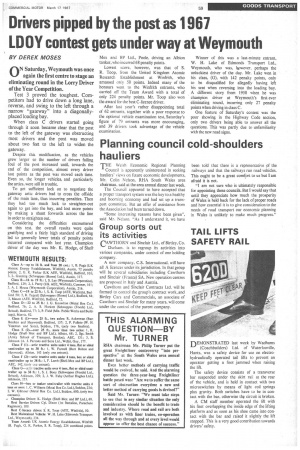Planning council cold-shoulders hauliers
Page 61

If you've noticed an error in this article please click here to report it so we can fix it.
THE Welsh Economic Regional Planning
Council is apparently uninterested in seeking hauliers' views on future economic developments, Mr. Cohn Nelson, RHA South Wales area chairman, said at the area annual dinner last week.
The Council appeared to have accepted that a proper transport system was the key to a healthy and booming economy and had set up a transport committee. But an offer of assistance from the Association had been turned down.
"Some interesting reasons have been given", said Mr. Nelson. "As I understand it, we have
Group sorts out its activities
CAWTHORN and Sinclair Ltd., of Birtley, Co. Durham. is to regroup its activities into various companies, under control of one holding company.
A new company, CS. International, will have all A licences under its jurisdiction. In that group will be several subsidiaries including Cawthorn and Sinclair (France) SA. New operation centres are proposed in Italy and Austria.
Cawthorn and Sinclair Contracts Ltd. will be formed to control the group's contract work, and Birtley Cars and Commercials, an associate of Cawthorn and Sinclair for many years, will come under the control of the parent company. been told that there is a representative 9f the railways and that the railways run road vehicles. This ought to be a great comfort to us but I am afraid it is not.
"I am not sure who is ultimately responsible for appointing these councils. But I would say that until they appreciate how much the prosperity of Wales is held back for the lack of proper roads and how essential it is to give consideration to the needs of road transport our economic planning in Wales is unlikely to make much progress."








































































































































































































